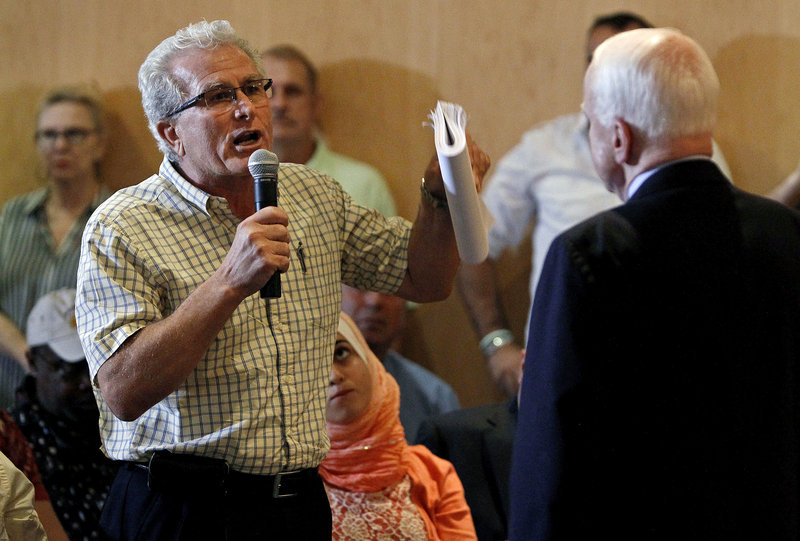WASHINGTON – Suggesting an uphill fight for President Obama, House members staking out positions are either opposed to or leaning against his plan for a U.S. military strike against Syria by more than a 6-1 margin, a survey by The Associated Press shows. The Senate is more evenly divided ahead of its vote next week.
Still, the situation is very fluid. Nearly half of the 433-member House and a third of the 100-member Senate remain undecided.
By their statements or those of aides, only 30 members of the Republican-led House support intervention or are leaning in favor of authorizing the president to use force against Syrian President Bashar Assad’s government in response to a chemical weapons attack last month. Some 192 House members outright oppose U.S. involvement or are leaning against authorization, according to the AP survey.
The situation in the Democrat-controlled Senate is better for Obama but hardly conclusive ahead of a potential vote next week. The AP survey showed those who support or are leaning in favor of military action holding a slight 34-32 advantage over those opposed or leaning against it.
Complicating the effort in the Senate is the possibility that a three-fifths majority may be required. Republican Sen. Rand Paul of Kentucky says he is going to filibuster.
Still, Sen. Harry Reid, the Democratic leader, predicted, “I think we’re going to get 60 votes.”
Speaking to reporters Friday after a summit of world leaders in St. Petersburg, Russia, Obama acknowledged the difficulties he faces in seeking support for action. He said he would address the nation on Tuesday.
“It’s conceivable at the end of the day I don’t persuade a majority of the American people that it’s the right thing to do,” Obama said. But the president, who again would not say what he would do if Congress rebuffed him, expressed confidence that the people and their lawmakers would listen to his case.
“Failing to respond,” he said, “would send a signal to rogue nations, authoritarian regimes and terrorist organizations that they can develop and use weapons of mass destruction and not pay a consequence.”
Whatever Obama might decide, a rejection from Congress would have wide-ranging ramifications in the U.S. and abroad.
If the administration goes ahead with cruise missile strikes and other limited action against Syrian targets, it could risk a constitutional crisis with angry lawmakers ahead of other confrontations over raising the U.S. debt ceiling, funding the government, overhauling immigration law and implementing Obama’s signature health care changes.
The alternative — that is, stepping back after weeks of war-like threats — could project weakness to an American foe that the U.S. says has repeatedly launched chemical weapons attacks. It also could send a signal to both allies and American enemies that the U.S. is too divided internally to back up its declarations with actions over everything from preventing Iran from developing nuclear weapons to containing the threat posed by North Korea’s erratic, nuclear-armed dictatorship.
How difficult is Obama’s challenge in Congress? Only 21 House members publicly back a resolution to attack Syria, and nine say they are considering giving their support. Some 100 House members oppose Obama’s plan, and 92 say they are leaning against it.
Opposition runs deep among Republicans and Democrats. So far, GOP lawmakers stand 148-9 against military action, when accounting for leaners. Democrats are opposed by a tally of 44-21.
For Obama to succeed, he’ll have to win about 90 percent of the undecided House members — or change the minds of those who are leaning against him.
Obama has support among House leaders of both parties.
Speaker John Boehner, R-Ohio, Majority Leader Eric Cantor, R-Va., and House Democratic leaders Nancy Pelosi of California and Steny Hoyer of Maryland are on board. But many rank-and-file members of both parties either oppose attacking Syria or are sitting on the sidelines until they learn more about the administration’s plans and see which way the political momentum turns.
There is still time for the administration to convince House members who are undecided or who’ve publicly expressed skepticism about military engagement. Reluctant lawmakers are often swayed during closed-door meetings. Just a third of the House and Senate have participated in any of the classified briefings with administration officials over the past week, underscoring that their votes may still be winnable.
All House members are invited to a classified briefing on Monday night, after Congress officially returns from summer break. House Democrats will meet Tuesday morning with White House Chief of Staff Denis McDonough, and House Republicans will meet separately at the same time. In the Senate, Republicans and Democrats will hold their weekly policy luncheons on Tuesday, a day before a likely vote to move forward on a resolution authorizing force.
With Republicans, the administration has a more difficult challenge.
Boehner and Cantor have provided little indication they’re willing to lobby for Obama’s cause, even if they support it. It’s also unclear how much they can deliver given that tea party and other conservative Republicans have repeatedly gone against Boehner.
Send questions/comments to the editors.



Success. Please wait for the page to reload. If the page does not reload within 5 seconds, please refresh the page.
Enter your email and password to access comments.
Hi, to comment on stories you must . This profile is in addition to your subscription and website login.
Already have a commenting profile? .
Invalid username/password.
Please check your email to confirm and complete your registration.
Only subscribers are eligible to post comments. Please subscribe or login first for digital access. Here’s why.
Use the form below to reset your password. When you've submitted your account email, we will send an email with a reset code.